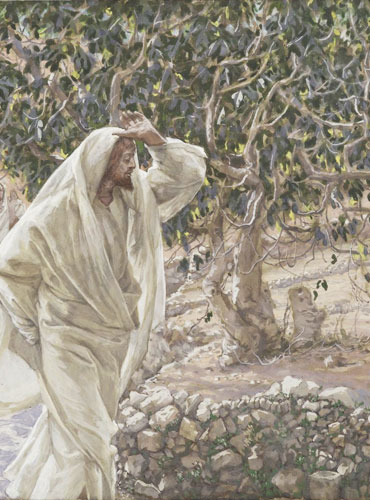Friday of the Eighth Week of Ordinary Time – Mk 11:11-26
Friday of the Eighth Week of Ordinary Time – Mk 11:11-26
Sometimes there are Gospel passages that make us shake our heads and wonder what is going on. This passage might be considered one of them: Jesus makes it to the Temple, looks around, and then leaves for Bethany. The following morning, heading back to the Temple, we’re told that Christ saw a fig tree in leaf from a distance, and so “he went over to see if he could find anything on it. When he reached it he found nothing but leaves,” but Mark tells us, too, that “it was not the time for figs” in the first place. Then Jesus curses it, saying, “May no one ever eat of your fruit again!” We then have the cleansing of the Temple, and, heading out the next morning, they pass the tree again: “The fig tree [was] withered to its roots. Peter remembered and said to Christ, ‘Rabbi, look! The fig tree that you cursed has withered,’” and this gives rise to a discourse about prayer. What are we to make of all this?
Some critics have said that Christ’s cursing of the tree is a fit of rage, or a childish tantrum. That’s not at all the case, since Christ is the Son of God and completely in control of His passions. Rather, Saint Augustine offers us a beautiful explanation. He notes that everything Christ does has a reason to it; there’s nothing done in vain, because everything is meant to teach us something. Some people “tend to focus merely upon miracle for miracles’ sake,” meaning, they see Christ’s power, but not what He was trying to teach us.
“Hence,” writes Augustine, such people “may prematurely conclude that Jesus himself was ignorant of the time of the year, something any ordinary farmer could discern. For it was not yet the season for the tree to bear fruit. Nevertheless, since he was hungry, he looked for fruit on the tree. Does this imply that Christ knew less than what every peasant could easily discern? Surely not. Wouldn’t you expect the maker of the fig tree to know what the ordinary orchard worker would know in a snap? So when he was hungry he looked for fruit on the tree, but he seemed to be looking for something more from this tree. He noted that the tree had no fruit, but was full of leaves. It was at that point that he cursed it, and it withered away.” In other words, Christ knew perfectly well that it wasn’t the time for bearing fruit. He wasn’t just angry, or hungry, but rather He’s teaching us a lesson.
What is this lesson? Augustine continues: “So what terrible thing had the poor tree done simply in not bearing fruit? Could the tree reasonably be faulted for its fruitlessness? No. But human beings who by their own free will decide not to bear fruit—that is a different matter. Those found wanting in accountability in this case are those who had the benefit of the law, which was meant to bear fruit, but they had no fruit to show for it. They had a full growth of leaves (the law), yet they bore no fruit (works of mercy).”
In other words, Augustine sees in this a symbol for the Jewish leaders who had the law, and yet bore no fruit. Some Biblical scholars note that figs would usually produce two sorts of fruits: there would be small figs early in the season, and these were often eaten by travelers. However, later in the season, the fruit would grow and the figs would be full-grown. Part of Jesus’ response, some say, is that, with all the leaves, there should have been at least little fruits, but there was nothing. The tree could produce leaves, but bore no fruit. Some authors have even seen in the fig leaves a reference to Adam and Eve, who covered themselves with fig leaves. The point of the leaves isn’t simply to cover over bad things, or to not commit sin, but rather to produce fruit.
So, what is the meaning for us and for our lives? As Christians, we’re blessed to have the life of God in our souls. That grace isn’t simply meant to hang out or do nothing, but rather to bear fruit. Again, sometimes we can be content to think that “we’re not as bad as other people.” After all, we probably haven’t murdered anyone or stolen large sums of money. However, the Kingdom of God isn’t a matter of doing less evil than other people, or of taking pride in the bad things we don’t do: rather, it is a matter of doing good, and bearing fruit for God.
Today, we can ask ourselves: if Christ came by and saw us, would He find fruit in our lives? Or would we be barren? We do not know when Christ will come for the harvest, and so we must be prepared. Through the intercession of Mary, Mother of God, let us ask for the grace to bear fruit for God and His Kingdom.






